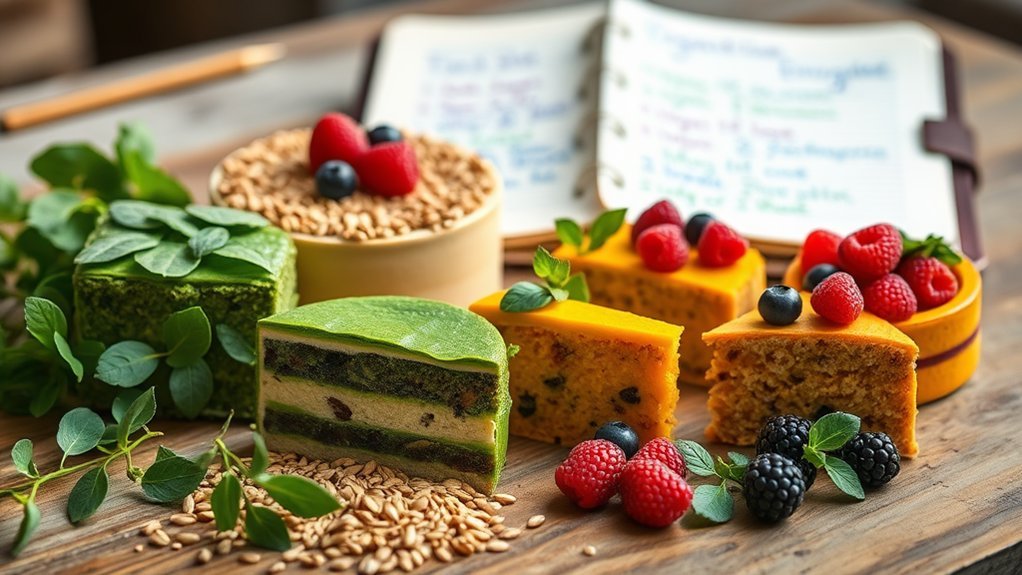Are Organic Cakes Really Healthier? A Dietitian’s Take
Yes, organic cakes can be healthier than non-organic ones. They often have more nutrients, such as vitamins and antioxidants, and use fewer artificial additives. Ingredients like whole grains and healthier fats enhance their nutritional value. Organic cakes can also be made with allergen-friendly ingredients, making them suitable for those with dietary restrictions. While they may cost more, the health and environmental benefits are worth considering. Explore further to learn more about their positive impact.
Key Takeaways
- Organic cakes often have fewer chemical additives and pesticides, making them a better option, particularly for those with allergies.
- They generally boast higher nutrient density, offering more vitamins, minerals, and antioxidants compared to non-organic cakes.
- Organic cakes typically use healthier fats and contain less sugar, contributing to a more balanced diet.
- Ingredients like whole grains and fibre-rich components in organic cakes support digestive health and keep you feeling fuller for longer.
- Choosing organic baking helps promote sustainable farming practices, which benefits both the environment and local communities.
Understanding Organic Ingredients

Understanding organic ingredients is straightforward. These foods are produced without synthetic pesticides or artificial additives. To be certified organic, products must contain at least 95% organic ingredients, ensuring transparency in sourcing. Organic farming uses natural fertilisers and pest control methods, which enhances soil quality and supports biodiversity. This not only benefits the environment but can also increase levels of certain vitamins and antioxidants in your meals. Additionally, consuming organic foods may reduce exposure to pesticide residues, promoting a healthier dietary choice. Furthermore, the commitment to organic certification ensures that producers adhere to rigorous standards, enhancing the integrity of the organic label.
Nutritional Benefits of Organic Cakes

Choosing organic cakes can offer you greater nutrient density and a boost in antioxidants. Organic ingredients typically contain more vitamins and minerals, which can contribute positively to your health. Additionally, the antioxidants in these cakes may help shield your body from oxidative stress, making them a wiser choice when you’re treating yourself. Moreover, incorporating multigrain rice cakes into your diet can support healthy digestion and reduce the risk of chronic diseases. Furthermore, organic cakes ensure freedom from synthetic pesticides, which enhances their overall health benefits.
Higher Nutrient Density
Organic cakes provide several nutritional advantages, largely because their ingredients have higher nutrient density. By opting for organic, you steer clear of harmful pesticides and enjoy produce that retains more nutrients, which can enhance absorption in your body. Incorporating whole grains into your organic cakes can further boost their fiber content, contributing to better digestion and overall health. Additionally, using natural sweeteners can help lower sugar content while still providing essential nutrients.
Organic farming also supports biodiversity and sustainable agriculture, benefiting both your health and the environment. Though both organic and conventional cakes are often high in carbohydrates and sugar, organic options usually offer superior nutritional profiles. Including whole grains, fruits, nuts, and natural sweeteners in your organic cakes can further elevate their health benefits, making them a better choice for your family and friends.
Enjoy the reassurance of serving healthier, chemical-free treats.
Antioxidant Richness
Many people view cakes as a treat, but opting for organic varieties can significantly increase your antioxidant intake. Organic cakes often include nutritious ingredients like fruits, whole grains, nuts, and seeds, all of which enhance antioxidant stability.
These ingredients not only help bolster your immune system but also provide anti-inflammatory and potential cancer-fighting benefits.
Moreover, organic farming practices improve soil quality and reduce chemical usage, leading to higher antioxidant levels in the ingredients. When you choose organic cakes, you’re not just indulging yourself; you’re also offering a healthier option to others.
The use of natural ingredients and less processing helps preserve nutrients, making these cakes a more wholesome choice for any gathering or celebration.
The Role of Antioxidants in Health

Antioxidants are vital for your health as they neutralise free radicals, which can lead to cellular damage associated with conditions like heart disease and cancer.
You can easily boost your antioxidant intake by including a variety of foods in your diet. Here are some great options:
- Bright berries, full of vitamins and beneficial compounds
- Leafy greens, rich in lutein and zeaxanthin, good for eye health
- Nuts and seeds, loaded with vitamin E and selenium
- Colourful spices, such as turmeric and cinnamon, which not only enhance flavour but also offer health benefits
Eating a diet rich in these whole foods may reduce your risk of disease and improve your overall health.
Dietary Fiber and Digestive Health

Incorporating whole grains into your diet increases your fibre intake, which is vital for digestive health.
Fibre not only helps regulate bowel movements but also supports beneficial gut bacteria, improving your gut microbiome. By understanding the different types of fibre and their specific benefits, you can enhance your digestive wellness and overall health.
For instance, foods like oats and brown rice are excellent sources of soluble fibre, which can help lower cholesterol levels and keep you feeling full longer.
Whole Grains Benefits
Whole grains offer numerous benefits, particularly for digestive health due to their high fibre content. By opting for whole grains, you’re not just making a healthier choice; you’re also aiding your digestive system.
Here are some key advantages:
- Prevents constipation thanks to high fibre
- Reduces inflammation in the digestive tract
- Promotes regular, soft, and bulky stools
- Helps you feel fuller for longer
Incorporating whole grains such as brown rice, oats, and quinoa into your meals can significantly boost your overall health.
Unlike refined grains, whole grains retain vital nutrients, making them a more advantageous choice. By prioritising whole grains, you’re supporting your digestive health and overall well-being, while also providing nutritious options for those around you.
Fiber’s Role Explained
Fiber is vital for digestive health, acting as a natural support for your gut. It helps regulate bowel movements, preventing constipation and ensuring digestive balance. Both soluble and insoluble fibers offer distinct benefits, promoting good bacteria and overall gut wellness.
| Type of Fiber | Benefits |
|---|---|
| Soluble Fiber | Lowers cholesterol, helps control blood sugar levels |
| Insoluble Fiber | Aids regular bowel movements, prevents constipation |
A diet high in fibre can assist with weight management and may lower the risk of chronic illnesses. Staying hydrated is crucial to fully harnessing the digestive benefits of fibre. Incorporating fibre-rich foods like fruits, whole grains, and legumes will benefit your health and support others in their wellness journeys.
Digestive Health Connections
A balanced diet high in dietary fibre is essential for good digestive health. To support your gut microbiome and overall well-being, include a variety of fibre sources in your meals.
Here are some straightforward options:
- Whole grains like brown rice and quinoa
- Fresh fruits such as apples and berries
- Colourful vegetables like carrots and cauliflower
- Nutritious legumes, including lentils and beans
Incorporating these foods can make a significant difference to your digestive balance.
Impact on Allergies and Atopic Diseases

While many enjoy tasty cakes, the effects of organic cakes on allergies and atopic diseases are crucial for families, especially those with children.
Research indicates that regularly consuming organic foods might help reduce allergies, particularly in young ones. Organic cakes often use allergen-friendly ingredients like coconut milk or almond flour, making them safer for those with allergies.
Additionally, organic farming minimises pesticide exposure, which can benefit immune development and lower the risk of atopic diseases.
However, while studies suggest a link between organic diets and fewer allergies, further research is necessary to fully grasp these effects.
Ensuring clear labelling and providing allergen-free options can enhance safety for consumers.
Addressing Obesity and BMI Concerns

Choosing organic cakes means you’re selecting products made with nutrient-rich ingredients that can aid in weight management.
These options typically have lower sugar and healthier fats, contributing to a balanced diet that may help reduce your BMI.
Nutrient Density Comparison
Understanding the nutrient density of organic cakes is important, particularly if you’re mindful of obesity and BMI. Although organic labels may imply healthier choices, many organic cakes can still be high in sugar and fat, much like their conventional counterparts.
Here are some key points to consider:
- The source of ingredients matters—using whole grains and minimal processing can boost nutritional value.
- Nutrient density can differ significantly based on the specific ingredients used.
- The perception of healthiness often doesn’t match the actual nutritional content.
- Portion control is crucial, no matter if the cake is organic or not.
For instance, a slice of organic chocolate cake might look appealing, but if it’s packed with sugar, it can still contribute to weight gain.
Always check the ingredients and serve sizes.
Healthy Ingredient Choices
Choosing the right ingredients for organic cakes can significantly impact your health, especially if you’re mindful of obesity and BMI. Embracing organic cake trends, such as using organic fruits and natural sweeteners like maple syrup, can help reduce your refined sugar intake.
Selecting sustainable ingredients, such as gluten-free flours and healthy fats like coconut oil, not only enhances flavour but also boosts nutritional value.
Dairy-free alternatives, such as almond milk, cater to various dietary needs while lowering saturated fats.
Incorporating high-fibre options like oats and nuts increases satiety and supports healthier eating habits.
Customisable cake options allow you and your clients to make informed choices, promoting a positive approach to desserts without compromising health.
Weight Management Benefits
Enjoying organic cakes can satisfy your sweet tooth and aid in weight management, particularly for those mindful of obesity and BMI.
Here are a few points to consider:
- They often have fewer calories than conventional cakes, which helps maintain calorie balance.
- Many are made with high-fibre ingredients, promoting good digestive health.
- Practising mindful consumption can help you avoid overindulging.
- Opt for nutrient-dense choices to ensure a well-rounded diet.
Heart Health and Omega-3 Fatty Acids

Omega-3 fatty acids are crucial for heart health, particularly in lowering the risk of cardiovascular disease. Including sources of omega-3, such as oily fish like salmon and mackerel, can help manage heart disease risk factors. Research indicates that EPA (eicosapentaenoic acid) is effective in reducing triglyceride levels and preventing heart attacks, making it an important part of your diet.
| Omega-3 Type | Benefits | Sources |
|---|---|---|
| EPA | Lowers heart attack risk | Oily fish, supplements |
| DHA | Supports overall heart health | Fish, algae |
| ALA | Important for general health | Flaxseeds, walnuts |
| Fish Oil | Combination of EPA and DHA | Capsules, liquid form |
| Purified EPA | Specific heart health benefits | Prescription supplements |
Incorporate these fatty acids into your meals for improved heart health.
Chronic Disease Prevention Through Diet

Diet plays a crucial role in preventing chronic diseases. Making the right nutritional choices can significantly reduce your risk of conditions such as heart disease, diabetes, and certain cancers.
Here are some key dietary elements to consider:
- Whole grains like brown rice and quinoa
- A variety of colourful fruits and vegetables
- Protein from legumes and nuts
- Healthy fats from avocados and olive oil
Incorporating these foods can improve your overall health, reduce inflammation, and support your metabolism.
By focusing on a balanced intake of macronutrients and minimising processed foods, you can take control of your well-being.
Environmental Benefits of Organic Baking

When you dive into the realm of organic baking, you’ll discover its notable environmental advantages that go beyond health benefits. By selecting organic ingredients, you support sustainable practices that lower carbon emissions through local sourcing and reduce the use of harmful agricultural chemicals, safeguarding ecosystems.
Organic baking also encourages efficient water usage, conserving this vital resource and enhancing water quality. Moreover, using eco-friendly packaging helps cut down on waste, reinforcing your commitment to the environment.
Every organic cake you bake supports local farmers and boosts biodiversity, nurturing healthy ecosystems. Embracing these eco-friendly practices not only elevates your baking but also makes a positive impact on the planet for future generations.
Technological Innovations in Organic Cakes

In the realm of organic cakes, cutting-edge technology is transforming how we bake and savour these treats. Innovations like 3D printing and AI-assisted baking allow for highly personalised cakes that reflect individual preferences.
Incorporating fermented ingredients and savoury flavours brings global tastes and healthier options to the table.
- Sustainable packaging made from biodegradable materials helps reduce waste.
- Virtual tasting experiences engage customers while minimising food waste.
- Natural sweeteners, such as monk fruit, provide a lower-calorie alternative for sweetening cakes.
- Experiential designs and storytelling cakes offer artistic flair with every slice.
These trends not only enhance visual appeal but also prioritise eco-friendly practices, making organic cakes a delightful and responsible choice.
Consumer Awareness and Healthy Choices

Many people aim to make healthier food choices, but navigating the world of organic and nutritious options can be tricky. Since the pandemic, consumer preferences have shifted towards organic and minimally processed foods.
However, nearly half of you may still face misconceptions about what healthy eating really means, which can lead to confusion. Limited access to certain products and financial constraints can also make your journey to healthier eating more difficult.
Education is crucial; by understanding nutrition labels, you can make more informed decisions. With 79% of you regularly checking these labels, it’s vital to look for natural ingredients and holistic options.
The Community and Societal Impact of Organic Foods

Organic foods are increasingly central to discussions about community health and sustainability, particularly regarding their impact on local economies and environmental practices.
Here are a few ways organic foods can make a difference:
- Encourage community involvement through local farmers’ markets.
- Promote sustainable farming methods that improve soil health.
- Reinforce societal values that prioritise ethical consumption.
- Boost economic growth for local farmers competing in the market.
However, organic foods often come with a higher price tag, which can restrict access for lower-income communities.
While they support environmental sustainability, organic shops are frequently located in wealthier areas.
Frequently Asked Questions
Are Organic Cakes Safe for Individuals With Food Allergies?
When looking at organic cakes, it’s important to consider food allergies and ingredient clarity. Some cakes may appear safe, but always check for relevant certifications and potential cross-contamination to ensure a stress-free experience. For instance, a cake labelled gluten-free may still be made in a facility that handles wheat. Staying informed is key!
How Do Organic Cakes Impact Weight Management Long-Term?
The effect of organic cakes on long-term weight management mainly hinges on their calorie count and the quality of their ingredients. Though they may appear to be a healthier option, it’s crucial to enjoy them in moderation and maintain a balanced diet for successful weight control. For instance, a slice of organic chocolate cake might still pack a caloric punch, so it’s wise to savour it as an occasional treat rather than a regular indulgence.
Are Organic Cakes Gluten-Free Options Available?
Yes, gluten-free options with organic certifications are available at bakeries such as Knead Love and Coco Luv Cookies. They use gluten-free ingredients like almond flour, ensuring tasty cakes for everyone, including those with dietary restrictions.
Do Organic Cakes Have a Longer Shelf Life Than Conventional Cakes?
Organic cakes typically have a shorter shelf life compared to conventional cakes. This is due to their use of natural ingredients, which tend to spoil more quickly. For instance, a traditional sponge cake with preservatives might last a week, while an organic version could only be fresh for about five days. Storing them properly can help keep them tasty for a bit longer, but it’s best to enjoy organic cakes sooner for the best quality.
How Can I Incorporate Organic Cakes Into a Balanced Diet?
You can include organic cakes in a balanced diet by making healthier swaps, watching your portion sizes, and pairing them with nutritious foods. For instance, enjoy a slice of organic carrot cake alongside a serving of fresh fruit or a dollop of Greek yoghurt. This way, you can relish your treats while still prioritising your overall health.
Conclusion
In conclusion, while some may see organic cakes as merely a fad, there’s evidence that they can provide genuine benefits. With higher amounts of antioxidants and dietary fibre, these cakes can be a tasty way to support your health. Additionally, opting for organic helps foster a healthier environment and bolsters local communities. So, the next time you treat yourself to a slice, remember that organic cakes can be a delightful part of a balanced diet, combining enjoyment with a sense of purpose.







